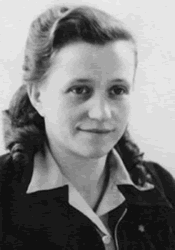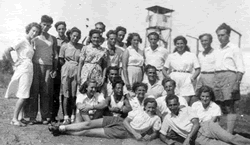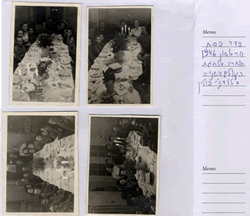Hasia Bornstein Bilitzka

The Ghetto Fighters' House holds the largest collection of documents, certificates and albums that deal with the Zionist Coordination in Poland. Hasia Bornstein Bilitzka has graciously donated to the museum's archive the documentation that she has kept and guarded over the years on the children's orphanage and the children who were under her care. Among the materials donated are photographs from the orphanage she directed in Lodz, the children who were at the displaced persons camps in Germany and the "Children's Kibbutz" that Hasia managed at the deportee camp in Cyprus after the war. Also included is Hasia's personal notebook with the list of every single child from the Lodz orphanage, letters she received from the children and those that she sent to them, as well as relevant newspaper clips.
Hasia Bilitzka was born in Grodno, Belorussia. From an early age she was a member of the "Shomer Hatzair" youth movement. During the war she was a part of the underground in Grodno, and afterwards in Bialystok, where she took on the false identity of a Polish girl, and lived on the Aryan side of the city. She was a courier in the underground as well as a liaison with the Polish underground. After the Bialystok revolt she and her friends served as liaisons for the partisan brigade in the forests, bringing them equipment, food supplies and ammunition, as well as information about what was happening in the forests, where the German army facilities were located and how they were advancing. On the basis of this information, the forest was conquered by the Red Army without a single casualty. Hasia and the other couriers received the highest honor giving by the Red Army to citizens for their efforts during the war.
After the war, she returned to Warsaw and joined the "Aktiva" work movement which consisted of youth movement members that survived in Poland and those who returned from the USSR. This organization decided to unite the youth movements in order to continue the Zionist movement activities and to jointly form kibbutzim for the "Shomer Hatzair" and "Dror" members in cities throughout Poland. Hasia arrived in Lodz in 1945 for this purpose, and youth came from all over the city to a kibbutz that was established there as well as to the Jewish Central Committee. The motto of the kibbutz was: Individual work and existence – work as a value and as the means to settling the Land of Israel.
At the end of 1945, Hasia was sent with two of her friends from the "Shomer Hatzair" to the movement's first meeting of the European Council after the war where she met a movement friend from Switzerland, Heini Bornstein, whom she married later on. At the beginning of 1946, she returned to Lodz and directed one of the two orphanages for the Zionist Coordination for Saving Jewish Children. She received children and toddlers who had survived in Poland as well as those who were granted reparations from the USSR.
Hasia was both mother and sister for the children at the orphanage, which was run like one big family (73 children). She describes her life in the orphanage in her book Ahat MiMeatim ("One of the Few") "From the day we opened the orphanage, I moved in, 24 hours a day, the children and I…seven days a week, Saturdays and holidays, non-stop, for 18 months"
After a few months Hasia and the children were moved to Germany through Shtzetzin, with the help of the Bricha organization. They arrived in Libek, displaced persons camp in Zaltzheim and from there to a camp in Dornstadt. Going through France, they arrive in Haifa on one of theMaapilim (illegal immigration) ships, but are sent by the British to a camp on Cyprus. In 1947 Hasia and the children return to Israel, were sent to the detention camp at Atlit for two weeks and finally to Kibbutz Gan Shmuel, where Hasia ends her 18 month journey with the children.

At the Cyprus detention camp
Hasia and Heini Bornstein were among the founders of Kibbutz Lahavot Habashan in the Upper Galilee, where they still live today. They have remained in contact with the children from the orphanage throughout the years.
Hasia and Heini Bornstein were among the founders of Kibbutz Lahavot Habashan in the Upper Galilee, where they still live today. They have remained in contact with the children from the orphanage throughout the years.

First Passover in Lodz after the war in 1946